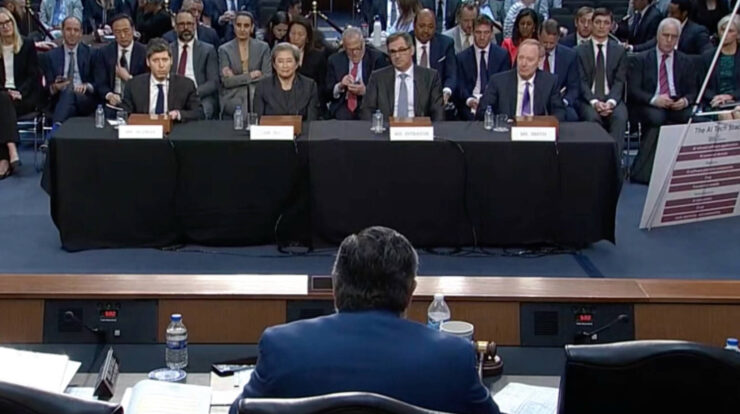
Leaders from AMD, Microsoft, and OpenAI criticize AI regulations causing profitability issues.
Leaders from major U.S. tech firms like Microsoft, AMD, and OpenAI criticized the current policies set forth by the Biden administration regarding exports of AI hardware. They argued that staying ahead in the competition with China requires facilitating access to American technological resources rather than imposing stricter regulations.
Their comments before the US Senate come as the Trump administration weighs sweeping changes to Biden-era export controls, which were set to cap sales of AI accelerators to most countries outside the US and a select few allies.
During a Senate hearing on Thursday, Microsoft President Brad Smith stated, “The primary determinant of which country—either the U.S. or China—will prevail in this competition hinges largely on whose technology gains the widest acceptance globally.” In his argument, he contended that the artificial intelligence dissemination regulations introduced under the previous government conveyed to the international community that they might not be able to rely on the U.S. to provide them with suitable products for their AI requirements.
What steps would you take to place a wager on suppliers when you doubt their ability to meet your requirements?
AMD’s CEO, Lisa Su, supported Smith’s views, cautioning that if U.S. firms are denied the opportunity to fulfill international demand for AI technology, the federal government might unintentionally push these businesses towards partnering with Chinese suppliers instead.
Currently, the U.S. leads in developing cutting-edge AI accelerators globally; however, China is rapidly closing this gap despite facing some challenges, according to Su. Additionally, she mentioned that having top-tier processors isn’t always necessary to compete in the field of artificial intelligence.
“Having the best chips is great, but even if you don’t have the best chips, you can get a lot done,” she said.
Su and Smith concur that although export controls are essential for national security to stop advanced U.S. technologies from reaching undesirable parties, they could use some refinement to be less stringent.
“I believe the discussion regarding export controls and regulations ought to be straightforward and easy to understand,” Su stated.
Smith was more direct, suggesting that Uncle Sam scrap the compute limits proposed for so-called tier-2 nations. These nations include just about every country not already subject to US arms embargoes – and go way beyond the 18 countries on Uncle Sam’s best-friends list.
“I think we should eliminate the numerical limits imposed on all of these second-tier countries,” he stated.
Smith and Su are hardly the first to call this tune. Executives from Nvidia and Cerebras have made similar arguments.
“We need to accelerate the diffusion of American AI technology around the world,” Nvidia CEO Jensen Huang said during a press conference earlier this month. “The policies and encouragement from the administration really need to support that.”
Sam Altman, CEO of OpenAI, expressed his pleasure at seeing these regulations revoked. This stance contrasts with remarks made by competitors at Anthropic, who favored imposing stricter limitations on chips than previously suggested.
“I concur that certain limitations will be necessary,” he stated. “However, I believe that focusing on fostering diffusion rather than preventing it aligns us correctly moving forward.” He continued, “Impact arises when individuals adopt American goods and services across various levels—from utilizing ChatGPT over alternatives like DeepSeek, to relying on U.S.-made semiconductors and data center technologies.”
In the over-three-hour conversation, Altman minimized the risk posed by Chinese models such as DeepSeek-R1 and stressed the significance of addressing these models via competitive means.
He mentioned they plan to unveil an open-source model which they think will become the top choice this summer, as their aim is for people to develop using the U.S. framework.
At the same time, the Trump administration is indicating that changes lie ahead.
A spokesperson for the Commerce Department informedReutersthis week thatthe BidenAIregulationis too complicatedand excessivelyadministrative, which could hinderAmericaninnovation. They addedthat theywill besubstitutingitwitha more straightforwardruleaimedatboostingAmericaninnovationalongside securingAmericasleadinAItechnology.
Considering the erratic nature of the Trump administration regarding foreign trade regulations up until now, it’s challenging to predict their final form. Certain experts believe that the president might consider using AI accelerators as an additional tool for negotiation when traditional tariff measures fail to yield desired outcomes.
The regulations from the Biden era were scheduled to come into play on May 15, so we will know about them before that date.





